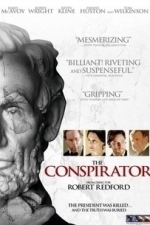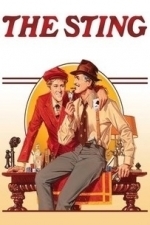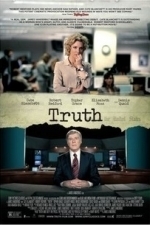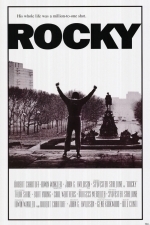Search
Search results
Andy K (10823 KP) rated The Conspirator (2011) in Movies
Sep 1, 2019
Love me a good true historical drama
Director Robert Redford delves into a story everyone knows, but doesn't really know.
After the assassination of our 16th and very popular president, Abraham Lincoln, the conspirators are shot and/or caught to face an outraged and shocked nation right at the end of the Civil War. Among the accused is Mary Surratt who is on trial for her involvement in aiding, lodging and collaborating with those accused. The entire nation wants justice however they can get it, so her circumstance seems dire without a lot of reprieve.
Enter her reluctant defense attorney who doesn't really want the job of defending a woman everyone wants to see brought to justice. Her trial seems one-sided at best with witnesses changing their stories and the judges not allowing much argument against the accused.
Mary herself seems she has given up hope with little regard for her own life.
Redford manages to build the tension slowly as the evidence becomes increasingly bleak for the defendant and everyone's eyes on the trial's outcome. Stellar performance by the always interesting James McAvoy. He wrestles with his own emotions and the growing prejudice the trial has brought upon him and his family to persevere and provide ample defense for his client.
After the assassination of our 16th and very popular president, Abraham Lincoln, the conspirators are shot and/or caught to face an outraged and shocked nation right at the end of the Civil War. Among the accused is Mary Surratt who is on trial for her involvement in aiding, lodging and collaborating with those accused. The entire nation wants justice however they can get it, so her circumstance seems dire without a lot of reprieve.
Enter her reluctant defense attorney who doesn't really want the job of defending a woman everyone wants to see brought to justice. Her trial seems one-sided at best with witnesses changing their stories and the judges not allowing much argument against the accused.
Mary herself seems she has given up hope with little regard for her own life.
Redford manages to build the tension slowly as the evidence becomes increasingly bleak for the defendant and everyone's eyes on the trial's outcome. Stellar performance by the always interesting James McAvoy. He wrestles with his own emotions and the growing prejudice the trial has brought upon him and his family to persevere and provide ample defense for his client.
BankofMarquis (1832 KP) rated The Sting (1973) in Movies
Mar 29, 2020
On my list of All Time Favorite Films
I'll come right out and say it - the 1973 Academy Award winning film for Best Picture, THE STING, is one of the greatest films of all time. It's well written, well acted, well directed with a memorable musical score and characters, situations, costumes and set design that become richer over time and through repeated viewings.
Set in Chicago in the gangster-ridden, depression era mid-1930's, THE STING tells the tale of two con man who join forces for the ultimate con of a vile N.Y. Gangster who is responsible for killing a friend of theirs.
From everything I have read about it, the script by David S. Ward (who won an Oscar for his work) arrived pretty much finished. He shaped the story of the con men - and the myriad pieces of misdirection - fully before shopping it around to the studios. Universal jumped all over it and tabbed veteran Director George Roy Hill (BUTCH CASSIDY AND THE SUNDANCE KID) to helm the picture. Hill - being no dummy - saw this as a vehicle to re-team Newman and Redford (stars of Butch Cassidy) and the rest...as they say...is history.
Newman and Redford are perfectly cast as veteran grifter Henry Gondorff (Newman) and up and coming grifter Johnny Hooker (Redford). They have an ease of playing off of each other - each one complimenting the other one - both giving in their scenes with the other one which makes the scenes more rich and alive. They are joined by a veritable "who's who" of late '60's/early '70's character actors - Harold Gould, Eileen Brennan, Charles Durning, Ray Walston and Dana Elcar - all of them bring their "A" game and they are fun to watch. Special notice should be made to Robert Earl Jones (father of James Earl Jones) as Luther, the character who's fate propels the plot forward.
But...none of this would work if you didn't have a "bad guy" that was interesting to watch - and to root against - and bad guys don't get much better...and badder...than Robert Shaw's Doyle Lonnegan. Shaw plays Lonnegan as a physically tough boss who doesn't suffer failure, but is smart enough to avoid obvious traps. He is a worthy adversary of Gondorff and Hooker's and it is fun to watch Newman, Redford and Shaw play off each other. One other note - it was with this performance that Universal recommended Shaw to young Director Stephen Spielberg for his "shark flick" JAWS.
Edith Head won her 8th (and last) Oscar for the magnificent period costumes in this film and Marvin Hamlisch won for the Music - a surprising hit on the pop charts of re-channeled Scott Joplin tunes. The set design won an Oscar - as did the Director, George Roy Hill. All in all, the film won 7 out of the 11 Oscars it was nominated for (Redford was nominated for Best Actor, but did not win).
THE STING is a well crafted film. One that tells a timeless story and that stands the test of time as a testament of how great of an achievement in film this is. It is one of my All Time favorites.
Letter Grade: the rare A+
5 stars (out of 5) and you can take that to the Bank(ofMarquis)
Set in Chicago in the gangster-ridden, depression era mid-1930's, THE STING tells the tale of two con man who join forces for the ultimate con of a vile N.Y. Gangster who is responsible for killing a friend of theirs.
From everything I have read about it, the script by David S. Ward (who won an Oscar for his work) arrived pretty much finished. He shaped the story of the con men - and the myriad pieces of misdirection - fully before shopping it around to the studios. Universal jumped all over it and tabbed veteran Director George Roy Hill (BUTCH CASSIDY AND THE SUNDANCE KID) to helm the picture. Hill - being no dummy - saw this as a vehicle to re-team Newman and Redford (stars of Butch Cassidy) and the rest...as they say...is history.
Newman and Redford are perfectly cast as veteran grifter Henry Gondorff (Newman) and up and coming grifter Johnny Hooker (Redford). They have an ease of playing off of each other - each one complimenting the other one - both giving in their scenes with the other one which makes the scenes more rich and alive. They are joined by a veritable "who's who" of late '60's/early '70's character actors - Harold Gould, Eileen Brennan, Charles Durning, Ray Walston and Dana Elcar - all of them bring their "A" game and they are fun to watch. Special notice should be made to Robert Earl Jones (father of James Earl Jones) as Luther, the character who's fate propels the plot forward.
But...none of this would work if you didn't have a "bad guy" that was interesting to watch - and to root against - and bad guys don't get much better...and badder...than Robert Shaw's Doyle Lonnegan. Shaw plays Lonnegan as a physically tough boss who doesn't suffer failure, but is smart enough to avoid obvious traps. He is a worthy adversary of Gondorff and Hooker's and it is fun to watch Newman, Redford and Shaw play off each other. One other note - it was with this performance that Universal recommended Shaw to young Director Stephen Spielberg for his "shark flick" JAWS.
Edith Head won her 8th (and last) Oscar for the magnificent period costumes in this film and Marvin Hamlisch won for the Music - a surprising hit on the pop charts of re-channeled Scott Joplin tunes. The set design won an Oscar - as did the Director, George Roy Hill. All in all, the film won 7 out of the 11 Oscars it was nominated for (Redford was nominated for Best Actor, but did not win).
THE STING is a well crafted film. One that tells a timeless story and that stands the test of time as a testament of how great of an achievement in film this is. It is one of my All Time favorites.
Letter Grade: the rare A+
5 stars (out of 5) and you can take that to the Bank(ofMarquis)
Andy K (10823 KP) rated Truth (2015) in Movies
Aug 11, 2019
The truth is out there...
Doubtful anyone from outside the United States (or even many within the US) would remember "Rathergate", the subject this film explores, but I found it fascinating nonetheless.
The US during the 2004 presidential election between George W Bush and John Kerry saw the usual mudslinging back and forth, but this film is not really about that. The film focuses on a news story by CBS news involving then airmen George W Bush and his "attempt" to get out of going to Vietnam and certain important military paper which were supposed to have corroborated these events.
Producer Mary Mapes and then anchor Dan Rather decided to air the story on 60 Minutes before they had flushed out all their sources and may have brushed aside criticism which happened to be against their political beliefs and ran with the story anyways. After airing in the fall of 2004 certain aspects of the documents came into question as to whether they could've been written with typewriters of the time or whether these documents were forgeries made by someone who could've merely used Microsoft Word instead.
Repeated attempts to legitimize their accuracy ended up having the opposite effects having witnesses change their stories, allegiances or even admit they had not been honest when presenting their original facts.
Since this is based on actual events, I can say this ended up costing producer Mapes and Rather their careers and sullied their reputations for the rest of their lives.
Even though the film has a very specific set of facts it has to deal with, I found it just as interesting when the director showed scenes of the audience viewing the story when it aired and then began to think about the state of modern news.
Nowadays, most people get their news cycle from internet headlines, scrolling information at the bottoms of television screens and even siloed one-sided stories that support only their own personal political beliefs
I think the broader message this film is trying to convey is that news organizations have the utmost responsibility to not only the report the news, but to keep their biases out of the mix and to make sure every fact is checked and rechecked to make sure they report accurately. News can change public opinion and even though they mostly get things correct, mostly isn't good enough.
I love Cate Blanchett and the legend Robert Redford and they don't disappoint here. The screenplay by writer and first time director James Vanderbilt is pointed and mostly avoids injecting opinion into the facts and presents an interesting and fascinating film I would easily recommend.
The US during the 2004 presidential election between George W Bush and John Kerry saw the usual mudslinging back and forth, but this film is not really about that. The film focuses on a news story by CBS news involving then airmen George W Bush and his "attempt" to get out of going to Vietnam and certain important military paper which were supposed to have corroborated these events.
Producer Mary Mapes and then anchor Dan Rather decided to air the story on 60 Minutes before they had flushed out all their sources and may have brushed aside criticism which happened to be against their political beliefs and ran with the story anyways. After airing in the fall of 2004 certain aspects of the documents came into question as to whether they could've been written with typewriters of the time or whether these documents were forgeries made by someone who could've merely used Microsoft Word instead.
Repeated attempts to legitimize their accuracy ended up having the opposite effects having witnesses change their stories, allegiances or even admit they had not been honest when presenting their original facts.
Since this is based on actual events, I can say this ended up costing producer Mapes and Rather their careers and sullied their reputations for the rest of their lives.
Even though the film has a very specific set of facts it has to deal with, I found it just as interesting when the director showed scenes of the audience viewing the story when it aired and then began to think about the state of modern news.
Nowadays, most people get their news cycle from internet headlines, scrolling information at the bottoms of television screens and even siloed one-sided stories that support only their own personal political beliefs
I think the broader message this film is trying to convey is that news organizations have the utmost responsibility to not only the report the news, but to keep their biases out of the mix and to make sure every fact is checked and rechecked to make sure they report accurately. News can change public opinion and even though they mostly get things correct, mostly isn't good enough.
I love Cate Blanchett and the legend Robert Redford and they don't disappoint here. The screenplay by writer and first time director James Vanderbilt is pointed and mostly avoids injecting opinion into the facts and presents an interesting and fascinating film I would easily recommend.
Matthew Krueger (10051 KP) rated Rocky (1976) in Movies
Nov 24, 2020
Underdog Tale
Rocky is a classic. A tale of a underdog rising to the top. At the same time its a story of rocky. A underdog, a fighter, a lover, a southpaw, a man who wont give up.
The plot: Rocky Balboa (Sylvester Stallone), a small-time boxer from working-class Philadelphia, is arbitrarily chosen to take on the reigning world heavyweight champion, Apollo Creed (Carl Weathers), when the undefeated fighter's scheduled opponent is injured. While training with feisty former bantamweight contender Mickey Goldmill (Burgess Meredith), Rocky tentatively begins a relationship with Adrian (Talia Shire), the wallflower sister of his meat-packer pal Paulie (Burt Young).
The film, made on a budget of just over $1 million, was a sleeper hit; it earned $225 million in global box office receipts, becoming the highest-grossing film of 1976. The film was critically acclaimed and solidified Stallone's career as well as commenced his rise to prominence as a major movie star of that era.
Among other accolades, it went on to receive ten Academy Award nominations, winning three, including Best Picture. In 2006, the film was selected for preservation in the United States National Film Registry by the Library of Congress as being "culturally, historically or aesthetically significant". Rocky is considered to be one of the greatest sports films ever made and was ranked as the second-best in the genre, after Raging Bull, by the American Film Institute in 2008.
The film has spawned seven sequels: Rocky II (1979), Rocky III (1982), Rocky IV (1985), Rocky V (1990), Rocky Balboa (2006), Creed (2015), and Creed II (2018). Stallone portrays Rocky in all eight films, wrote seven of the eight films, and directed four of the six titular installments.
Sylvester Stallone wrote the screenplay for Rocky in three and a half days.
United Artists liked Stallone's script, and viewed it as a possible vehicle for a well-established star such as Robert Redford, Ryan O'Neal, Burt Reynolds, or James Caan.
Stallone's agents, Rumar and Kubik, insisted that Stallone portray the title character, to the point of issuing an ultimatum. Stallone later said that he would never have forgiven himself, had the film become a success with somebody else in the lead.
During filming, both Stallone and Weathers suffered injuries during the shooting of the final fight; Stallone suffered bruised ribs and Weathers suffered a damaged nose, the opposite injuries of what their characters had.
The first date between Rocky and Adrian, in which Rocky bribes a janitor to allow them to skate after closing hours in a deserted ice skating rink, was shot that way only because of budgetary pressures. This scene was originally scheduled to be shot in a skating rink during regular business hours. However, the producers decided that they could not afford to hire the hundreds of extras that would have been necessary for that scene.
Its a excellent movie.
The plot: Rocky Balboa (Sylvester Stallone), a small-time boxer from working-class Philadelphia, is arbitrarily chosen to take on the reigning world heavyweight champion, Apollo Creed (Carl Weathers), when the undefeated fighter's scheduled opponent is injured. While training with feisty former bantamweight contender Mickey Goldmill (Burgess Meredith), Rocky tentatively begins a relationship with Adrian (Talia Shire), the wallflower sister of his meat-packer pal Paulie (Burt Young).
The film, made on a budget of just over $1 million, was a sleeper hit; it earned $225 million in global box office receipts, becoming the highest-grossing film of 1976. The film was critically acclaimed and solidified Stallone's career as well as commenced his rise to prominence as a major movie star of that era.
Among other accolades, it went on to receive ten Academy Award nominations, winning three, including Best Picture. In 2006, the film was selected for preservation in the United States National Film Registry by the Library of Congress as being "culturally, historically or aesthetically significant". Rocky is considered to be one of the greatest sports films ever made and was ranked as the second-best in the genre, after Raging Bull, by the American Film Institute in 2008.
The film has spawned seven sequels: Rocky II (1979), Rocky III (1982), Rocky IV (1985), Rocky V (1990), Rocky Balboa (2006), Creed (2015), and Creed II (2018). Stallone portrays Rocky in all eight films, wrote seven of the eight films, and directed four of the six titular installments.
Sylvester Stallone wrote the screenplay for Rocky in three and a half days.
United Artists liked Stallone's script, and viewed it as a possible vehicle for a well-established star such as Robert Redford, Ryan O'Neal, Burt Reynolds, or James Caan.
Stallone's agents, Rumar and Kubik, insisted that Stallone portray the title character, to the point of issuing an ultimatum. Stallone later said that he would never have forgiven himself, had the film become a success with somebody else in the lead.
During filming, both Stallone and Weathers suffered injuries during the shooting of the final fight; Stallone suffered bruised ribs and Weathers suffered a damaged nose, the opposite injuries of what their characters had.
The first date between Rocky and Adrian, in which Rocky bribes a janitor to allow them to skate after closing hours in a deserted ice skating rink, was shot that way only because of budgetary pressures. This scene was originally scheduled to be shot in a skating rink during regular business hours. However, the producers decided that they could not afford to hire the hundreds of extras that would have been necessary for that scene.
Its a excellent movie.



